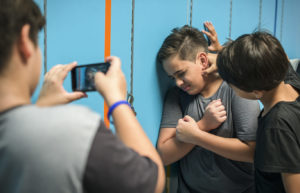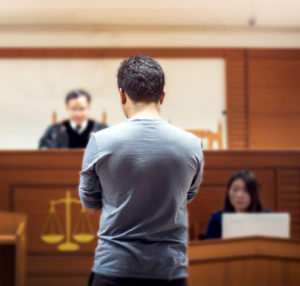The Legal Consequences of Bullying
Posted April 26th, 2019 by Anthony Carbone, PC.
Categories: Family Law.
 Every day it seems like your child makes some excuse to avoid going to school. You try to talk to him and find out what’s going on, but he refuses to say why. You’re concerned but don’t think much of it until the day he comes home with a black eye and torn clothing. You finally find out that he’s a victim of bullying.
Every day it seems like your child makes some excuse to avoid going to school. You try to talk to him and find out what’s going on, but he refuses to say why. You’re concerned but don’t think much of it until the day he comes home with a black eye and torn clothing. You finally find out that he’s a victim of bullying.
You’re angry and go straight to the principal, who informs you that the school has no responsibility in preventing bullying. Is that true? And if the school refuses to help, can you take legal action? How can you protect your child from bullying at school?
Different Types of Bullying
 Bullying is becoming a growing problem in our schools. According to the Mom Loves Best blog, between 20 and 28 percent of children in grades 6 through 12 will experience sometimes bullying. What’s even sadder is that less than half of bullied children (approximately 40 percent) will report the bullying to an adult.
Bullying is becoming a growing problem in our schools. According to the Mom Loves Best blog, between 20 and 28 percent of children in grades 6 through 12 will experience sometimes bullying. What’s even sadder is that less than half of bullied children (approximately 40 percent) will report the bullying to an adult.
According to Mom Loves Best, the different types of bullying include:
- Physical: When physical force such as hitting, kicking, pushing, and touching someone in an unwanted way, is being used.
- Verbal: Any communication from the bully, including cruel and threatening remarks, taunting, name-calling, and inappropriate sexual comments.
- Relational: This type of bullying is more about hurting the child’s reputation and relationships, such as not being invited to a party right in front of the child.
- Damage to Property: The bully will steal, damage, or alter the target’s property. For example, the bully takes the victim’s bike and destroying it instead of returning it.
- Cyberbullying: The bully is using technology to harass the victim, such as posting negative comments on the victim’s Facebook page.
Children who are most at risk for bullying include LGBTQ children, those with disabilities, those with low self-esteem, and generally anyone who may be “different.”
What Does the Law Say About School Bullying?
 Is there any legal recourse for bullying in school? In New Jersey, there are thanks to NJSA 18A:37-13. The statute is designed to prevent harassment, intimidation, and bullying in New Jersey schools, so students are free to learn without being intimidated or threatened.
Is there any legal recourse for bullying in school? In New Jersey, there are thanks to NJSA 18A:37-13. The statute is designed to prevent harassment, intimidation, and bullying in New Jersey schools, so students are free to learn without being intimidated or threatened.
New Jersey law also requires school districts to adopt guidelines against harassment, intimidation, and bullying, known as HIB policies. A team comprised of community members, school employees, parents, and volunteers can create these policies and should include the following information:
- The policy consists of statements that prohibit harassment, intimidation, and bullying in school;
- The policy defines what harassment, intimidation, and bullying are;
- Description of behavior expected from students; and
- Consequences and remedial actions for those involved in those actions.
School districts are required to share the HIB policy and notify students and parents of its availability. In most cases, it is up to the principal to determine whether any reports warrant investigation and action.
Can You Bring a Lawsuit Against the School?
 So, does that mean a parent can sue the school for a case of bullying? Technically, yes — but it can be an uphill battle unless you have an experienced attorney involved.
So, does that mean a parent can sue the school for a case of bullying? Technically, yes — but it can be an uphill battle unless you have an experienced attorney involved.
For more than 30 years, the Law Offices of Anthony Carbone has been helping protect children throughout New Jersey. He understands your feelings of anger and frustration and will do everything he can to help you get the justice your child deserves.
Don’t wait any longer! Contact Attorney Anthony Carbone today for a free consultation.
CALL NOW 201-829-3829


